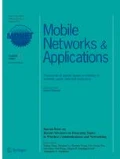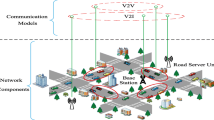Abstract
The routing efficiency in Delay Tolerant Networks (DTN) with social characteristics degrades owing to intermittent connection and high latency. Additionally, congestion is another issue because of the limited resources of nodes. To solve these problems, an improved Socially Aware Congestion Control algorithm (SACC) is proposed. In this algorithm, the social features and the congestion level of the node are utilized to construct a Social Congestion Metric (SCM). In the forwarding process, messages are forwarded to the nodes with higher SCM. When the congestion occurs, the node calculates the social links of itself with every message’s destination node, and then drops the message with minimum social link rather than random dropping. Simulation results show that in the acceptable range of delay tolerance, the proposed algorithm improves the delivery probability, decreases the dropping probability and reduces the overhead.













Similar content being viewed by others
References
Fall K (2003) A delay-tolerant network architecture for challenged internets. Proc ACM SIGCOMM:27–34
Pentland A (2005) Socially Aware Computation and Communication. IEEE Comput 38(3):33–40
Spyropoulos T, Psounis K, Raghavendra C (2005) S. Spray and wait: An efficient routing scheme for intermittently connected mobile networks. In: Proceedings of the 2005 ACM SIGCOMM Workshop on Delay-Tolerant Networking. Philadelphia, pp 252–259
Barbara C, Elena F (2010) Privacy-Aware Access Control in Social Networks Issues and Solutions. Privacy and Anonymity in Information Management Systems Advanced Information and Knowledge Processing
Wang K, Shao Y, Shu L et al (2016) Mobile big data faulttolerant processing for eHealth networks. IEEE Netw 30(1):36–42
Fischer D, Herrmann K, Rothermel K (2010) GeSoMo-A General Social Mobility Model for Delay Tolerant Networks. Mobile Adhoc Sensor Syst 8(12):99–108
Liptchinsky V (2011) A Novel Programming Model for Social and Context Aware Computing. In: Proceedings of the 5th Summer School on Service Oriented Computing 2011, Hersonissos, Crete, Greece, pp 565–580
Jocelyne E, Fabio M, Konstantin A (2011) A game theoretic analysis of network design with socially-aware users. Computer Networks: The International Journal of Computer and Telecommunications Networking 55(1):106–118
Krohn M, Freedman M, Mazieres D (2004) On-the-fly verification of rateless erasure codes for efficient content distribution. In: Proceedings of IEEE Symposium on Security and Privacy, Oakland, USA, pp 226–239
Pentland A (2005) Socially Aware Computation and Communication. IEEE Comput 38(3):33–40
Lifei W, Haojin Z, Zhenfu C (2011) MobiID: A User-Centric and Social-Aware Reputation Based Incentive Scheme for Delay Disruption Tolerant Networks. Ad-hoc, Mobile, and Wireless Networks Lecture Notes in Computer Science
Bernhard K, Helmut H (2011) A socially aware caching mechanism for encounter networks. Telecommun Syst:1–8
Boldrini C, Conti M, Delmastro F (2010) Context- and social-aware middleware for opportunistic networks. J Netw Comput Appl 33(5):525C541
Chiara B, Marco C, Andrea P (2010) Design and performance evaluation of ContentPlace, a social-aware data dissemination system for opportunistic networks. Comput Netw 54(4):589C604
Seligman M, Fall K, Mundur P (2006) Alternative custodians for congestion control in delay tolerant networks. In: Proceedings of SIGCOMM workshop on Challenged networks, New York, USA, pp 229–236
Burgess J, Gallagher B, Jensen D (2006) MaxProp: Routing for Vehicle-Based Disruption-Tolerant Networks. In: Proceedings of INFOCOM, Barcelona, Catalunya, Spain, pp 1–11
Rango D, Tropea M, Laratta GB, et al (2008) Hop-by-Hop Local Flow Control over Interplanetary Networks Based on DTN Architecture. In: Proceedings of ICC, Beijing, China, pp 1920–1924
Bisio I, Cello M, Cola TD, et al (2009) Combined Congestion Control and Link Selection Strategies for Delay Tolerant Interplanetary Networks. In: Proceedings of IEEE GLOBECOM, Honolulu, USA, pp 1–6
Tan C, Zou J, Wang M, et al (2011) Correlated Data Gathering on Dynamic Network Coding Policy and Opportunistic Routing in Wireless Sensor Network. In: Proceedings of IEEE ICC, Kyoto, Japan, pp 1–5
Radenkovic M, Grundy A (2012) Efficient and adaptive congestion control for heterogeneous delay-tolerant networks. J Ad Hoc Netw 10(7):1322–1345
Thompson N, Nelson SC, Bakht M (2010) Retiring Replicants: Congestion Control for Intermittently-Connected Networks. In: Proceedings of IEEE INFOCOM, Turin, Italy, pp 1–9
Vahdat A, Becker D (2000) Epidemic Routing for Partially Connected Ad Hoc Networks. Technique Report, Department of Computer Science, Duke University, Durham
Davis JA, Fagg AH, Levine BN (2001) Wearable computers as packet transport mechanisms in highly-partitioned ad-hoc networks. In: Proceedings of Fifth International Symposium on Wearable Computers, Zurich, Switzerland, pp 141–148
Lindgren A, Phanse KS (2006) Evaluation of queuing policies and forwarding strategies for routing in intermittently connected networks. In: Proceedings of IEEE COMSWARE, New Delhi, India, pp 1–10
Nicolas K, Joshua F, Paul A (2010) Prometheus: User-Controlled P2P Social Data Management for Socially-Aware Applications. In: Proceedings of the ACM/IFIP/USENIX 11th International Conference on Middleware, Berlin, Germany, vol 6452, pp 212–231
Li Y, Zhao Y, Liu Z, et al. (2009) N-Drop: congestion control strategy under epidemic routing in DTN. In: Proceedings of International Conference on Wireless Communications and Mobile Computing, New York, USA, pp 457–460
Thomas T, Jeff R, Felix W (2010) Social Email: A Framework and Application for More Socially-Aware Communications. Social Informatics Lecture Notes in Computer Science, vol 6430
Das R, Prodhan MA, Kabir MH (2011) A novel congestion control scheme for delay tolerant networks. In: Proceedings of International Conference on Selected Topics in Mobile and Wireless Networking (iCOST), Montreal, Canada, pp 76–81
Wang C, Zhao B, Yu W, et al. (2012) SARM: A Congestion Control Algorithm for DTN. In: Proceedings of 9th International Conference on Ubiquitous Intelligence & Computing and 9th International Conference on Autonomic & Trusted Computing (UIC/ATC), Fukuoka, Japan, pp 869–875
Rajiv M, Shailendra S (2011) Social network aware routing for delay tolerant networks. Commun Comp Inf Scie 190(1):101–110
Bulut E, Szymanski B (2012) Exploiting Friendship Relations for Efficient Routing in Mobile Social Networks. IEEE Trans Parallel Distrib Syst 12(23):2254–2265
Spyropoulos T, Psounis K, Cauligi S (2008) Efficient Rouitng in Intermittently Connected Mobile Networks: The Multiple-copy Case. IEEE Trans Netw Serv Manag 16(1):77–90
Keranen A, Ott J, Karkkaiinen T (2009) The ONE simulator for DTN protocol evaluation. In: Proceedings of the 2nd International Conference on Simulation Tools and Techniques, Rome, Italy, pp 1–10
Bisio I, Cello M, De C (2009) Combined Congestion Control and Link Selection Strategies for Delay Tolerant Interplanetary Networks. In: Proceedings of IEEE GLOBECOM, Honolulu, Hawaii, USA, pp 1–6
Ghosh J, Philip SJ, Qiao C (2007) Sociological orbit aware location approximation and routing in MANET. Ad Hoc Netw 5(2):189–209
Wang SY (2012) Distributed interplanetary Delay/Disruption Tolerant Network (DTN) Monitor and Control system. In: Proceedings of the Aerospace Conference, Big Sky, MT, pp 1–9
Liu Y, Wang K, Guo H, Qi J et al (2015) SAFM: an adaptive socially aware feedback mechanism in delay tolerant sensor networks. Int J Distrib Sens Netw 2015. Article ID 971704, doi:10.1155/2015/971704
Lin CC, Chin HH, Deng DJ (2014) Dynamic Multi-Service Load Balancing in Cloud-based Multimedia System. Proc IEEE Syst J:225–234
Caini C, Cruickshank H, Farrell S, Marchese M (2011) Delay- and Disruption-Tolerant Networking (DTN): An Alternative Solution for Future Satellite Networking Applications. Proc IEEE:1980–1997
Ramiro V, Lochin E, Senac P, Rakotoarivelo T (2013) On the limits of DTN monitoring. In: Proceedings of World of Wireless, Mobile and Multimedia Networks (WoWMoM), Madrid , pp 1–6
Ikeda M, Ishikawa S, Honda T, Barolli L (2015) Performance Evaluation of Message Suppression Method for DTN Routing Protocols. In: Proceedings of the 2015 Ninth International Conference on Complex, Intelligent, and Software Intensive Systems (CISIS), Blumenau, pp 225–230
Rohrer JP, Xie GG (2013) DTN hybrid networks for vehicular communications. In: Proceedings of 2013 International Conference on Connected Vehicles and Expo (ICCVE), Las Vegas, NV, pp 114–120
Wang K, Guo H (2014) An improved routing algorithm based on social link awareness in delay tolerant networks. Wirel Pers Commun 75(1):397–414
Mahendran V (2012) A pragmatic node based DTN performance modeling. In: Proceedings of World of 2012 IEEE international symposium on a wireless, mobile and multimedia networks (WoWMoM), San Francisco, CA, pp 1–2
Wang R, Burleigh SC, Parikn P, Lin CJ, Sun B (2011) Licklider Transmission Protocol (LTP)-Based DTN for Cislunar Communications. IEEE/ACM Trans Networking:359–368
Acknowledgment
This work is supported by NSFC (61572262); NSF of Jiangsu Province (BK20141427), NUPT (NY214097); Open research fund of Key Lab of Broadband Wireless Communication and Sensor Network Technology (Nanjing University of Posts and Telecommunications), Ministry of Education (NYKL201507), Qinlan Project of Jiangsu Province.
Author information
Authors and Affiliations
Corresponding author
Rights and permissions
About this article
Cite this article
Liu, Y., Wang, K., Guo, H. et al. Social-Aware Computing based Congestion Control in Delay Tolerant Networks. Mobile Netw Appl 22, 174–185 (2017). https://doi.org/10.1007/s11036-016-0759-8
Published:
Issue Date:
DOI: https://doi.org/10.1007/s11036-016-0759-8




